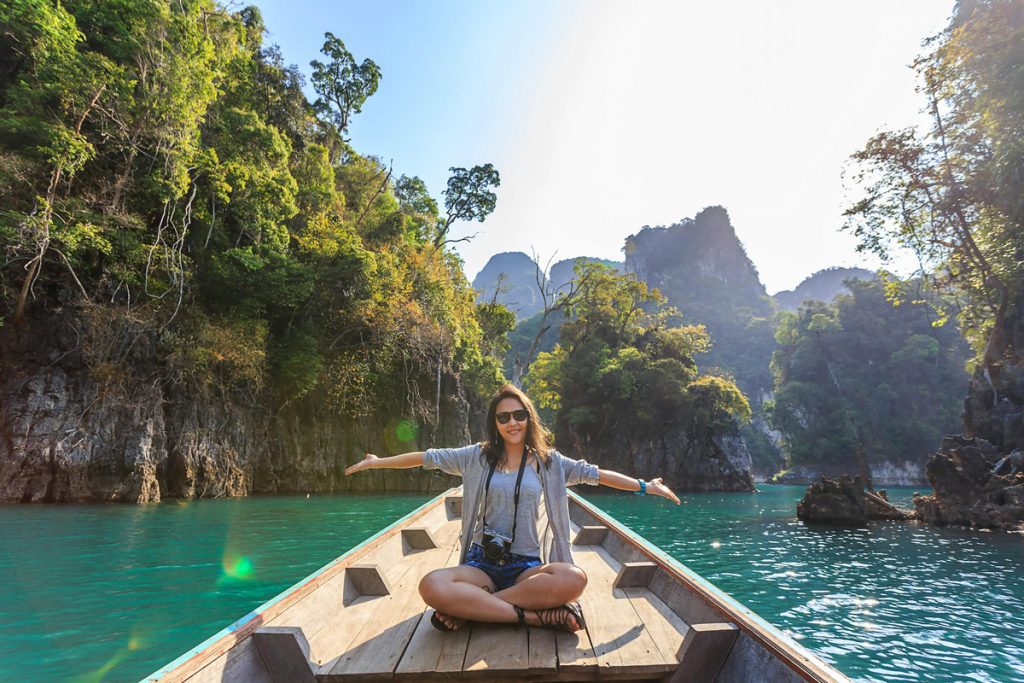Travel anxiety is a common issue that affects many travelers. The thought of traveling can bring about feelings of stress, fear, and hesitancy.
These feelings can arise from various concerns, such as:
- Fear of flying
- Unfamiliar places
- The potential for things to go wrong
This article will provide eight methods to help you overcome travel anxiety before and during your trip.
1. Start Early on Your Plan and Prep
One of the best ways to reduce travel anxiety is to thoroughly “scout out” your destination well in advance.
Knowing what to expect can help alleviate fears of the unknown. Look up information about your destination, including local customs, weather, transportation options, and popular attractions. Familiarizing yourself with the area can make you feel more comfortable and prepared.
Create a Detailed Itinerary
Creating a detailed itinerary can help you feel more in control of your trip. Plan your activities for each day, including travel times, accommodations, and meals. Having a clear plan can reduce the uncertainty that often contributes to travel anxiety. Working with a travel advisor during the planning process can help create a well-thought-out itinerary.
Prepare Important Documents and Items
If you have anxiety leading up to your trip, double-check your “to-do” list.
Ensure that you have all necessary documents and items prepared before your trip. This includes:
- Passport and tickets
- Accommodation reservations
- Medication and vaccine needs
- Any necessary visas
Pack your bags well in advance and make a checklist to ensure you don’t forget anything important. Knowing that you have everything you need can help reduce anxiety.
2. Practice Relaxation Techniques
Start with Deep Breathing Exercises
Deep breathing exercises can be very effective in reducing anxiety. Taking slow, deep breaths will calm your mind and body. Inhale through your nose for 2-4 seconds and exhale slowly through your mouth for 6-8 seconds (adjust according to comfort levels). This method can help lower your heart rate and decrease feelings of anxiety.
Then, Move to Meditation and Mindfulness
These techniques can help you stay present and focused, reducing anxiety. Spend a few minutes each day meditating or practicing mindfulness exercises. This can help you develop a more relaxed and positive mindset, which can be beneficial during your travels.
End with Progressive Muscle Relaxation
This method involves tightening then releasing various muscle groups throughout your body. It can help alleviate physical tension and lower anxiety levels.
Begin by tightening the muscles in your feet, hold for a few seconds, and then let go. Slowly move up through your body, repeating the process with each muscle group.
3. Use Positive Visualization
Imagine a Positive Experience
Positive visualization involves imagining yourself having a successful and enjoyable trip. Picture yourself arriving at your destination, exploring new places, and having a great time. This can help shift your focus away from negative thoughts and reduce anxiety.
Visualize Overcoming Challenges
If you have specific fears about your trip, try visualizing yourself overcoming these challenges. For example, if you are afraid of flying, imagine yourself calmly boarding the plane, taking off, and landing safely. Visualizing positive moments and feelings of happiness can help build your confidence and reduce anxiety.
4. Stay Informed and Updated
Monitor Travel Alerts
Stay informed about any travel alerts or advisories for your destination. This can help you prepare for potential issues and reduce anxiety.
The US State Department puts out travel advisories you should start with. Local government websites can help, too.
Stay Connected
Make sure you have a way to stay connected with family and friends during your trip. Psychology Today suggests this can provide a sense of security and support. Use your phone, email, or social media to keep in touch and share your travel experiences.
You might even browse social media groups and online forums to see what other travelers to your destination are doing.
5. Certain Apps May Help Soothe Travel Anxiety
Travel Apps
Using travel apps can make your trip smoother – especially by helping you manage your itinerary, find your way around unfamiliar places, and communicate more effectively with locals. The convenience of having these tools at your fingertips can significantly reduce travel-related stress.
Relaxation and Meditation Apps
There are also apps specifically designed to help with relaxation and meditation. These free downloads offer many tools to help reduce anxiety, such as:
- Guided meditations
- Relaxation exercises
- Powerful affirmations
Using them before and during your trip can help you maintain a calm and stable mood. Just search your app store, and you’ll find plenty of choices with strong reviews.
6. Seek Expert Help for Travel Anxiety
Therapy or Counseling
If your travel anxiety is severe, don’t feel embarrassed or ashamed to speak to a therapist or counselor. They can help you identify the root causes of your anxiety and develop strategies to manage it.
Cognitive-behavioral therapy (CBT) is particularly effective for anxiety disorders and can be very helpful for travel anxiety.
Medication Options
For some travelers, doctors may recommend medication to alleviate severe travel anxiety. Talk to your doctor about your symptoms and discuss potential treatment options. Anti-anxiety medications or beta-blockers are often effective, and a prescription will depend on several factors that your doctor will discuss with you.
Support Groups
Sharing your experiences with others who understand what you are going through can be very helpful – helping to alleviate underlying feelings of “I’m in this anxiety alone.”
Look for support groups in your area or online – there’s a chance you might find one near your travel destination, too, depending on the country.
7. Stay Fit, Healthy & Well-Rested
Prepare Your Nights for Deep REM Sleep
Lack of sleep can be a significant contributor to anxiety – and sometimes even the primary cause. Make sure you are well-rested before your trip to reduce the risk of feeling overwhelmed. During the trip (and the days leading up to departure), try your best to fall asleep at the same time every night – and certainly avoid caffeine, sugar, or electronics before bedtime.
Avoid Nutritional Deficiency
A balanced diet with plenty of fruits, vegetables, whole grains, and lean proteins can keep you feeling smooth and vibrant.
If you can pinpoint what your body responds to best (lots of dairy, high protein/meats, certain fruits or veggies, etc.), you can head into your trip feeling vibrant while maintaining strong immunity and energy levels.
Finding the right diet for you can take some experimenting, but the rewards of this effort will pay off – even after your travels.
Lots of Blood Flow & Exercise
We’re all aware of the mental health benefits of exercise – but even long walks and simple movements can help release endorphins that promote relaxation. Try to incorporate physical activity into your daily routine, even while traveling. This can be as simple as stretching or engaging in a soft workout.
8. Practice Self-Care and Compassion
Practicing self-compassion and being kind to yourself is crucial, particularly when dealing with travel anxiety. Recognize that feeling anxious is a common experience and perfectly normal. Show yourself the same kindness and empathy you would extend to a friend.
Focus on the Positive and Remind Yourself: It Will Pass
Remember the reasons why you wanted to travel in the first place. Whether exploring new places, meeting new people, or simply taking a break from your routine, focusing on the positive can help reduce anxiety.
At the end of the day, these feelings always pass, and you’ll soon return to a state of calm and serenity. There’s no need to worry about worrying.
Final thoughts
Travel anxiety is a common issue that can affect anyone. However, using these eight methods can reduce your anxiety and enjoy your travels more.
Plan and prepare thoroughly, practice relaxation techniques, use technology, talk to a professional, and take care of your physical health & nutrition. By implementing these strategies, you can overcome travel anxiety and have a more enjoyable and stress-free travel experience.
About the Author: Josh Rome is the Founder & CEO of Runway Health and a lifelong traveler, having explored over 70 countries to this day. After opening his own travel agency and seeing his clients’ struggles obtaining destination-specific medication for travel, Josh built Runway Health – the first direct-to-consumer telehealth company focused entirely on travel health.
rtor.org and Our Sponsor Laurel House, Inc. Celebrate Pride in June
On June 28, 1969, New York City police raided the Stonewall Inn, a gay nightclub in Greenwich Village, sparking a riot and six days of protests. This incident, known as the Stonewall Uprising, marks a turning point in the gay rights movement, now celebrated as Pride Month in June.
This Pride Month, www.rtor.org and Laurel House affirm their commitment to supporting members of the LGBTQ+ community in their quest for equity and justice, especially in their fight for accessible, safe, health, and mental health care.
www.rtor.org and Laurel House are committed to the advancement of racial equity and social justice, and to making mental health services available to all.
Photo by Te lensFix: https://www.pexels.com/photo/photo-of-woman-sitting-on-boat-spreading-her-arms-1371360/
The opinions and views expressed in any guest blog post do not necessarily reflect those of www.rtor.org or its sponsor, Laurel House, Inc. The author and www.rtor.org have no affiliations with any products or services mentioned in the article or linked to therein. Guest Authors may have affiliations to products mentioned or linked to in their author bios.
Recommended for You
- Dealing With Toxic Family Members: A Survival Guide for Family Gatherings - December 22, 2025
- When to Seek Help from a Child Psychiatrist: 6 Signs Your Child Needs Support - December 19, 2025
- When Everything Feels Urgent: How Clarity Protects Your Mental Health - December 18, 2025







